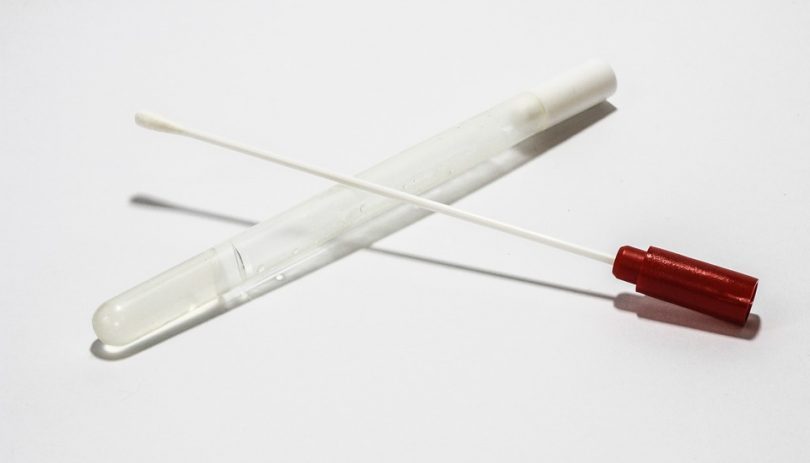In 2009, California ramped up its DNA collection operation, requiring samples from every person arrested on suspicion of a felony. Between 2009 and 2017, the state took DNA samples from more than 750,000 people who were never convicted of a felony. Those samples were submitted to the Combined DNA Index System (CODIS), a database used by law enforcement across the nation.
Innocent people (and those ultimately convicted of misdemeanors) hoping to get their sample removed from the database, must go through an official expungement process. But only a tiny fraction of those eligible for relief actually have their DNA expunged from the system. Of the more than 750,000 eligible people, only 1,282 had their DNA and profile in the national database erased.
This far-reaching system violates the state Constitution’s privacy rights and protection against unreasonable searches and seizures, according to a lawsuit brought by the Electronic Frontier Foundation (EFF) and the Law Office of Michael T. Risher. EFF and Risher are representing three plaintiffs: the Equal Justice Society (EJS), the Center for Genetics and Society (CGS), and a man named Pete Shanks, who is an expert on DNA and DNA databases and works as a consultant and writer for CGS.
“One-third of people arrested for felonies in California are never convicted,” said Marcy Darnovsky, CGS’s executive director. “The government has no legitimate interest in retaining DNA samples and profiles from people who have no felony convictions, and it’s unconstitutional for the state to hold on to such sensitive material without any finding of guilt.”
The lawsuit suggests that so few people have completed the expungement process because many either do not now that the state has kept their DNA, or they are not aware of their right to have their DNA expunged because the state is not required to inform them of this right. Others may have been discouraged by the complex series of steps required to complete the expungement process.
According to the lawsuit, keeping the DNA of innocent Californians in CODIS leaves them vulnerable to wrongfully becoming a suspect in a criminal case. DNA forensic evidence is not foolproof. While new DNA evidence often leads to the exoneration of people wrongfully convicted of crimes, tainted samples, mix-ups in the lab, and other errors can implicate innocent people, too.
“The overexpansion of the CODIS database and California’s failure to promptly expunge profiles of innocent arrestees exploits and reinforces systemic racial and socio-economic biases,” said EJS’s interim legal director, Lisa Holder. “We want the court to recognize that California’s DNA collection and retention practices are unfairly putting already vulnerable poor communities and people of color at even greater risk of racial profiling and law enforcement abuse.”
Earlier this year, the California Supreme Court overruled a lower court’s decision that the state was in breach of its constitution by seizing the DNA of all felony arrestees prior to any conviction. At the center of the case, People v. Buza, was Mark Buza, a man convicted of a misdemeanor for refusing to provide a DNA specimen when he was arrested on suspicion of arson.
The CA Supremes upheld the state’s DNA law.
California’s system is not the only DNA collection and retention operation that has come under fire and attracted media attention recently.
Embattled (and soon ousted) Orange County District Attorney Tony Rackauckas has run his own DNA testing program and built a controversial DNA database exclusive to the DA’s Office. This database, like California’s, is packed with the DNA of innocent people. Rackauckas takes his program a step farther, however, netting the DNA of people accused of misdemeanors in the OC.
Over the past 11 years, Rauckauckas’s unprecedented database filled with the DNA of 176,000 individuals suspected of non-serious misdemeanors through a “spit and acquit” strategy, which offered people freedom from any jail time in exchange for paying a $75 fee and giving a cheek swab, the OC Register reports. Like at the state-level, expungement has proven rare and difficult to achieve.
The controversial private lab (costing the county $1 million per year) and database now face possible extinction as Rackauckas’s bitter rival and successor, Todd Spitzer, prepares to take over as the county’s new top prosecutor. “I plan to bring in experts to advise me,” Spitzer told the Register. “I am not convinced the D.A. needs its own crime lab … I’m incredibly concerned that they are misusing the DNA lab to get convictions.”
The LA Times editorial board is aghast that Spitzer would even consider keeping the system in place which uses “DNA as a ransom,” and creates incredible conflicts of interest.
“No other district attorney in the nation keeps an essentially private database of this sort, and for good reason,” the editorial board writes.
“Everywhere else, DNA samples are collected by law enforcement and analyzed by labs that operate independently of the prosecutor’s office, to avoid conflicts of interest. The prosecutor who is trying to convict a defendant shouldn’t also run the lab and employ the experts who study the evidence and testify in court that one sample matches another.”
Spitzer, write the Times’ editors, should “scuttle” the system entirely.

